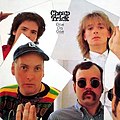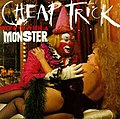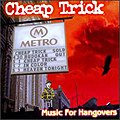Cheap Trick
Cheap Trick |
|---|
Cheap Trick is an American rock band from Rockford, Illinois, that gained popularity in the late 1970s. The band members are Rick Nielsen (lead guitar, vocals, main songwriter), Bun E. Carlos (born Brad Carlson) (drums, percussion), Robin Zander (vocals, rhythm guitar), and Tom Petersson (born Thomas Peterson) (bass guitar, vocals). Though they have had only brief flirtations with mainstream success, Cheap Trick has held a substantial following through regular touring and a hard-edged yet blissful pop sound that combines the tunefulness of The Beatles with the speed and energy of punk rock. The band's biggest hits over the years include "I Want You to Want Me", "Surrender", "Dream Police", "Don't Be Cruel" (a cover of Elvis' hit), and "The Flame". Their most recent release, Rockford, has gained critical acclaim.[1] [2]
History
(1968-1974) Virgin years
Rockford, IL, natives Rick Nielsen, Tom Petersson, and Bun E. Carlos, along with Wisconsin native Robin Zander formed a Midwest coming-of-age band just as the British Invasion hit. Inspired by British rock, these young men did what a lot of other young music fans did, picking up instruments and forming bands. While Bun E. Carlos performed in a band known as The Pagans (not the Punk Rock band) and released a single "Good Day Sunshine" and "I Can Only Give You Everything" on the flip side. Rick had a band called The Phaetons and then later with Grim Reaper, which also released a single "Hound Dog" and the flip side "Cruisin' for Burgers" (also released on the FUSE cd). Tom was in a band called The Bo Weevils. Tom and Rick eventually formed and toured as FUSE and made their long-playing debut album on a 1969 self-titled project FUSE. Nielsen and Petersson subsequently launched Sick Man of Europe with Carlos and Robert "Stewkey" Antoni, the former singer of Nazz.
Upon Robin Zander's induction to the band in 1974, Sick Man of Europe became Cheap Trick, and Midwest clubs were soon rocking to "The Ballad of Richard Speck", "ELO Kiddies" and "He's a Whore". In its early days Cheap Trick would be seen playing some free admission venues, such as Sinnissippi Park, on Rockford's east side (forshadowing their performances at parks in years to come). With a vivid image, a great singer and more instruments than a music store, Cheap Trick brought arena-scaled flamboyance to the unsigned band circuit, and became the area's biggest local attraction. After being sold on the idea by producer Jack Douglas (who had seen the group play at the Sunset Bowl in Waukesha, WI), Epic signed the group in 1976, and released its self-titled album the following February. The roaringly wild debut got great reviews but didn't sell; the more pop-conscious follow-ups, In Color and Heaven Tonight, were amazing pop records but it was the unexpected surprise platinum album At Budokan that made Cheap Trick a household name
(1976-1979) Success in Japan
The Budokan concerts introduced the Rick Nielsen and Tom Petersson composition "Need Your Love", which the band had already recorded proper for their next studio album, Dream Police, which was released later that year. The success the band enjoyed in Japan was enormous, some even describing the band as superstars in that country. This success far exceeded their popularity in the States, at least initially. After their Budokan success the band gained in popularity in the U.S. The look and sound of Cheap Trick in these early years was somewhat groundbreaking, if not always catagorizable. The black and white checkerboard motif used by Nielsen seemed to forshadow the large changes in the music and pop culture scene in the early 1980's, as typified by the movie Fast Times at Ridgemont High, where the character played by Sean Penn wore Vans sneakers with a similar checkerboard pattern. After the release of All Shook Up in 1980, bassist Tom Petersson left the group to produce other artists and record with his then-wife, Dagmar.
(1980-1987) Post-Petersson years
For subsequent tours Pete Comita, and shortly thereafter Jon Brant, replaced Petersson. The first album recorded with Brant was One on One, the group's seventh album, which appeared in 1982. It was produced by Roy Thomas Baker, famous for his work with Queen, the Cars and Foreigner among others. The following year the band released Next Position Please with Todd Rundgren as the producer. In 1985 they were reunited with Jack Douglas, who had produced their groundbreaking 1977 debut Cheap Trick, releasing Standing on the Edge. In 1986 the Doctor was released. It was the final album featuring Jon Brant. They also performed Mighty Wings in the movie Top Gun. In 1981, the band appearanced on Saturday Night Live, episode 6.7
(1988-1997) Record label problems
Bassist Tom Petersson rejoined the group in 1987 and helped record 1988's Lap of Luxury, the album from which the band's first-ever No. 1 single, "The Flame," came. He has remained with the band ever since.
Over the course of the 1990s the band experienced several new lows when Sony Music, the successor to the band's CBS Records contract, put Cheap Trick's name on several budget compilations including Voices, I Want You To Want Me, Don't Be Cruel, and several others without their prior knowledge, consent, or agreement. Robin Zander's self titled record produced by Jimmy Iovine was released in 1993 and quickly cut out.
The group had left CBS for Warner Brothers, but following the poor performance of the 1994 Warners album release Woke Up with a Monster, Cheap Trick decided it was time to go back to the basics, concentrating on using the strength of their live reputation and releasing new recordings to independent labels, rather than to major companies. Over the next few years several bands who had been influenced by Cheap Trick gave them opportunities to open for them. [citation needed]
In 1998, Cheap Trick signed with indie label/distributor Red Ant/Alliance, and released Cheap Trick. Seven weeks after the release, Red Ant/Alliance declared Chapter 11 bankruptcy, causing a furious music retail community to yank the record from stores and nearly bankrupting the band in the process.
(1998-2003) Rebuilding
1998 saw the band rebuilding by trying to restore normal relations with Sony and the music retail community, and establishing their own record company, Cheap Trick Unlimited. They toured behind the re-mastered re-releases of Budokan: the Complete Concert, and their first three records. One of the multi-night stands from this tour resulted in Music For Hangovers, a vibrant live effort. Amid much criticism, Cheap Trick Unlimited sold the CD exclusively on Amazon.com for 8 weeks prior to releasing it in stores. To support the record they headlined, co-billed with Guided By Voices, and opened for Pearl Jam. In early 2000, Cheap Trick entered into a license with Musicmaker.com to directly download and create custom CDs for over 50 songs. After spending a good part of 2001 writing songs and about six weeks of pre-production, Cheap Trick went into Bearsville Studios in Woodstock, NY in March 2002 where the band put together their first studio album in six years, Special One. Zander said, "This time each of us had songs and bits and pieces of songs – like a verse here, a chorus there, or a melody with no lyric. After putting it all together for this album, we'd lost track of who wrote what and just decided to put all of the writers on each song equally." Petersson added, "What I think is great about this record is that it sounds like an entire piece of music rather than a bunch of assorted, unrelated songs."
(2004-2007) Independence
You must add a |reason= parameter to this Cleanup template – replace it with {{Cleanup|section|reason=<Fill reason here>}}, or remove the Cleanup template.

Cheap Trick's own label, Cheap Trick Unlimited, was started in 1997, controlling a substantial inventory of master recordings, including Cheap Trick 97 (Red Ant), Woke Up with a Monster (Warner Bros. 1994), Silver (a double live CD/DVD), Music for Hangovers (live CD/DVD), various singles including the theme from Fox's That 70's Show, "That 70's Song" and "Cold Turkey", Bun E. in a Box (a drum sample CD), plus various videos and live footage. Nielsen commented: "Running our own label has been a lot of fun. One day Bun E. gets to be President and one day I get to play President." Zander added: "It's been a little tedious and a little overwhelming at times but we've got more control over our chaos." In May 2003, Cheap Trick brought their record label to Big3 Entertainment. Under the deal, Cheap Trick Unlimited/Big3 Records released Special One. Said Bun E.: "We brought our label to Big3 because we got tired of being record moguls and riding around in limos and making the big bucks. We thought we'd give Big3 a chance."
In 1999, a live version of their song Surrender from the Live At Budokan album was used in the soundtrack to the movie Detroit Rock City.
Cheap Trick wrote and performed the theme song for Comedy Central's The Colbert Report, featuring former Daily Show correspondent Stephen Colbert. Rick Nielsen recently played guitar with Peter Frampton and members of indie band The Decemberists for a jam session at the end of Stephen Colbert's humorous "Shred-Off" at the end of Colbert's show, the Colbert Report. Rick Nielsen is also the creator of the theme for the Colbert Report.
Cheap Trick also perform "That '70s Song", the theme song to the Fox Network television series That '70s Show. The song is a remake of the Big Star song "In The Street", but with references to Cheap Trick's own "Surrender" included. In the 2003 film Daddy Day Care, performing the song "Surrender", with Jeff Garlin in guest vocals. On March 7th, 2006, "Surrender" became the theme song to the new ABC show, Sons and Daughters.
On June 6, 2006, Cheap Trick released the album Rockford on Cheap Trick Unlimited/Big3 Records. The first single from the album was "Perfect Stranger" (produced by Linda Perry and co-written by Cheap Trick and Perry). The band promoted the album through appearances on the Sirius and XM satellite radio networks and a North American tour. Also in 2006, "Surrender" was featured as a playable track in the hit video game Guitar Hero II.
In 2007, officials of Rockford, Illinois honored Cheap Trick by reproducing the Rockford album cover art on that year's "city sticker" (vehicle registration).
Instruments
You must add a |reason= parameter to this Cleanup template – replace it with {{Cleanup|section|reason=<Fill reason here>}}, or remove the Cleanup template.
The band is known for its use of unusual guitars and basses. Robin Zander plays a Hamer 12-string guitar in addition to a Gibson Firebird, Chandler "Telecaster" and Rickenbacker 450. Rick Nielsen is an avid collector who, despite rationalizing his guitar collection, still has over 250 very desirable collector's piece guitars currently in his possession. He has collaborated with manufacturers, primarily Hamer, for some personalized custom guitars. For example, Nielsen has commissioned guitars based on Cheap Trick albums (including "Rockford" and "The Doctor") and even songs such as "Gonna Raise Hell." In addition, Nielsen is known for his five-necked guitars and electric mandocellos.
Bassist Tom Petersson is generally credited for having the initial idea for a 12-string bass. The first 12-string bass was designed by Jol Dantzig and custom made by Hamer Guitars following a request from Petersson. Petersson had used a Hagstrom 8-string bass, and then asked Hamer Guitars to make him a 12 string bass. The company was doubtful that the neck of a 12-string bass would stay in one piece, due to the massive tension the strings would exert and so they initially made him a 10-string bass. Following the successful trial use of that bass, the prototype 12-string bass (The Hamer 'Quad') was produced. Petersson is a somewhat fanatical bass collector and has also used 12-string basses made by Kids (a Japanese guitar maker), Chandler, and Waterstone, as well as an impressive array of 4, 5 and 8 stringed basses from other manufacturers.
Discography
Studio albums
-
Cheap Trick 1977 -
In Color 1977 -
Heaven Tonight 1978 -
Dream Police 1979 -
All Shook Up 1980 -
One on One 1982 -
Next Position Please 1983 -
Standing on the Edge 1985 -
The Doctor 1986 -
Lap of Luxury 1988 -
Busted 1990 -
Cheap Trick 1997 -
Special One 2003 -
Rockford 2006
Live albums
-
At Budokan 1979 -
Music for Hangovers 1999 -
Silver 2001
Compilations
- (1991) The Greatest Hits
- (1996) Sex, America, Cheap Trick (box set including unreleased tracks)
- (2000) Authorized Greatest Hits
- (2004) The Essential Cheap Trick
Movie soundtracks
- Over The Edge (1979)
- Roadie (1980)
- Up The Academy (1980)
- Heavy Metal (1981)
- Rock & Rule (1981)
- Spring Break (1983)
- Up The Creek (1984)
- Top Gun (1986)
- Say Anything (1988)
- Caddyshack 2 (1988)
- Another Way (1988)
- Queens Logic (1990)
- Look Who’s Talking Too (1991)
- Gladiator (1992)
- Encino Man (1992)
- Howard Stern's Private Parts (1997)
- Small Soldiers (1998)
- Detroit Rock City (1999)
- Joe Dirt (2001)
- Daddy Day Care (2003)
- This Thing of Ours (2003)
- Garfield: The Movie (2004)
- John Tucker Must Die (2006)
Singles
- (1977) "Oh Candy"
- (1978) "Surrender" - #62 US
- (1979) "I Want You To Want Me" - #7 US, #29 UK
- (1979) "Ain't That A Shame" - #35 US
- (1979) "Dream Police" - #26 US
- (1980) "Voices" - #32 US
- (1980) "Way Of The World" - #73 UK
- (1980) "Everything Works If You Let It" - #44 US
- (1980) "Stop This Game" - #48 US
- (1982) "If You Want My Love" - #45 US, #57 UK
- (1982) "She's Tight" - #65 US
- (1985) "Tonight It's You" - #44 US
- (1986) "It's Only Love" - US
- (1988) "The Flame" - #1 US, #77 UK
- (1988) "Don't Be Cruel" - #4 US, #77 UK
- (1988) "Ghost Town" - #33 US
- (1989) "Never Had A Lot To Lose" - #75 US
- (1990) "Can't Stop Fallin' Into Love" - #12 US
- (1990) "Wherever Would I Be?" - #50 US
- (1994) "Woke Up With A Monster" - US
- (1994) "You're All I Wanna Do" - US
- (1996) "Gift" - US
- (1997) "Say Goodbye" - US
- (1997) "Baby Talk/Brontosaurus" - US
- (1999) "That 70's Song" - US
- (2003) "Scent Of A Woman" - US
- (2006) "Perfect Stranger" - US
- (2006) "Come On, Come On, Come On" - US
VIDEO GAMES
A cover of "Surrender" is featured in the video game "Guitar Hero II".
External links
- Cheap Trick.com - Official website
- ^ "http://www.nwherald.com/EntertainmentSection/sound/289510367160740.php".
{{cite web}}: External link in|title= - ^ "http://www.rocknworld.com/features/06/CheapTrick.shtml".
{{cite web}}: External link in|title=



